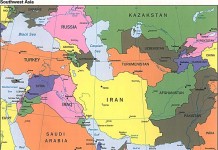Context
.jpg)
A change in the South Asian geo-political environment has emerged following the initiation of Pakistan-US strategic dialogue in mid-March 2010. Many in Delhi are perceiving the dialogue in the context of Pakistan-India relations, whereby, not only is Pakistan trying to attain strategic parity with India but is also is attempting to pressurize India on issues such as Kashmir and the water disputes between the two countries.
As India becomes increasingly wary of the US strategy in the region even more emphasis is now being laid on renewing India’s relations with Russia.
Analysis
Russian Prime Minister Vladimir Putin’s visit to India on March 12, 2010, went a long way in further strengthening the cordial ties between India and Russia. Although the visit lasted less than 24 hours, the two countries finalized five major deals including those on nuclear energy, defense and space co-operation. Putin emphasized the importance of such collaboration and cited the example of the Russian GLONASS, which was partly developed by Indian experts, as proof of this. When referring to the strategic partnership of both countries in fighting terrorism, Putin said that both Russia and India were concerned about extremist activities in Afghanistan and Pakistan, and called for international aid to Islamabad in order to counter terrorism. This surely would have been pleasing to the US.
New Delhi in particular, remains cautious of Washington’s growing ties with Islamabad and continues to express its concerns at the potential for Pakistan to exert greater influence in Afghanistan at India’s expense. It is no wonder then, that Afghanistan remained an important issue of discussion between India and Russia, as India was between the US and Pakistan. In a joint statement following the meeting, the Indian Prime Minister, Singh, declared that New Delhi and Moscow had agreed to intensify consultations on Afghanistan and the challenges posed by extremism in the region. On his part, Vladimir Putin said that he understood Indian concerns about “terror groups” in Afghanistan and Pakistan, and assured his Indian friends that Moscow would not enter into any defense deal with Islamabad.
Although terrorism is a growing problem for both countries, the major concerns for India and Russia remain geo-strategic. India is primarily worried about a possible resurgence of Pakistani influence in Afghanistan, while Russia wants to prevent the US from turning the country into a permanent base; thereby extending its presence into the Central Asia region. Neither country, however, wants to undermine its relations with the US. Closer ties with each other would undoubtedly serve as a useful means to assert their sovereign interests.
During the Cold War, India and the former Soviet Union had a close strategic relationship to counter ties between the US, China and Pakistan. The Soviet Union used to be India’s largest arms supplier, however, following the collapse of the USSR, the US and Israel both made inroads into the Indian arms market. Currently, European corporations and the US are also competing with Russian companies to supply the Indian Air Force with fighter jets. This shows that the deals signed during Putin’s trip go a long way to re-establishing Russia as the dominant military supplier.
In an effort to counter Chinese influence in the region, the previous Bush administration established an economic and strategic partnership with India. Accordingly, the US-India nuclear deal was signed and India made strategic gains in Afghanistan after the US military toppled the Taliban regime in 2001, marginalizing Pakistan. Unlike his predecessor, President Obama has re-evaluated the objectives of US foreign policy around the world and has put together a renewed emphasis and focus on the Af-Pak theater. One of the premises of this new approach is to strengthen his country’s ties with Pakistan, a key ally in the fight against the Taliban and Al-Qaeda. In this context, the Obama administration routinely provides military assistance to the Pakistani armed forces to conduct offensives in its tribal areas along the Afghanistan border.
Russian concerns about the new Obama strategy aimed at changing the situation in Afghanistan and along the border with Pakistan also continue to grow. For example, the Russian envoy to the UN, Vitaly Churkin, told the UN Security Council that talks about the settlement of the Afghan conflict could only be held with people who have broken off links with Al-Qaeda and other terrorist organizations. His remarks followed the UN decision to extend the mandate of the International Security Assistance Force for Afghanistan to one more year.
Deeper dialogue between Russia and India will also be a cause of concern for NATO. The US and other western powers want India, which has a $1.3bn development program in Afghanistan, to remain aligned with NATO policy. They are strongly opposed to any possibility of taking steps towards reforming the former Northern Alliance, a military political coalition of Uzbeks, Tajiks and Hazara, that fought the Taliban from the late 1990s with support from regional allies. Indian diplomats have even gone ahead and suggested the creation of a “hedging strategy”, with Iran and central Asian states, in response to the events in Afghanistan. Accordingly, the strategic depth that the extremist elements in both Afghanistan and Pakistan will acquire in the region has been identified as a common threat for Russia, Central Asia and India.
Tell Us What You Think
Feedback@politact.com



